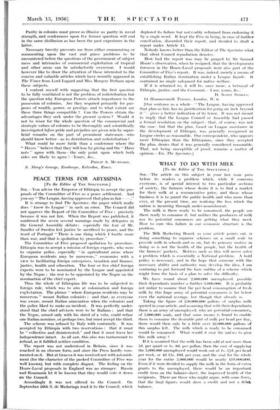PEACE TERMS FOR ABYSSINIA
[To the Editor of THE SPECTATOR.]
SIR,—You advise the Emperor of Ethiopia to accept the pro- posals of the Committee of Five as a peace settlement. And you say " The League, having approved that plan as fair —."
It is strange to find The Spectator, the paper which really does " know its League " in such an error. The Council did not approve the Report of the Committee of Five ; precisely because it was not fair. When the Report was published, it confirmed the seven several warnings made by delegates in the General Assembly debate; especially the fear of Mr. Sandler of Sweden lest justice be sacrificed to peace, and the word of Portugal " There is one thing which I loathe more than war, and that is spoliation by procedure."
The Committee of Five proposed spoliation by procedure. Ethiopia was to accept a mission of foreign experts, who were to organise police, especially in agricultural areas where European residents may be numerous," economies with a view to facilitating ftireign enterprises, taxation and finance, justice, health and education. The four or five chief foreign experts were to be nominated by the League and appointed by the Negus ; the rest to be appointed by the Negus on the nomination of the chief expert.
Thus the whole of Ethiopian life was to be subjected to foreign rule, which was to aim at colonisation and foreign exploitation. The phrase " where European residents may be numerous " meant Italian colonists ; and that, as everyone was aware, meant Italian annexation when the colonists and the police liked to make an incident. It was perfectly under- stood that the chief advisers were to be Italians ; and that the Negus, armed only with his shred of a veto, could refuse one Italian nominee, or perhaps two, but must accept the third.
The scheme was refused by Italy with contumely. It was accepted by Ethiopia with two reservations ; that it must be " collective and disinterested," and that it must leave her independence intact. As all saw, this also was tantamount to refusal, as it fulfilled neither condition.
The report was not understood in Britain, since it was couched in an obscure form, and since the Press hardly com- mented on it. But at Geneva it wag received not with astonish- ment (for the character of the packed Committee of Five was well known), but with complete disgust. The feeling on the Hoare-Laval proposals in England was no stronger. Russia and Roumania let it be known that they would vote it down On the Council.
Accordingly it was not offered to the Council. On September 26th S. de Madariaga read it to the Council, which
deplored its failure but noticeably refrained from endorsing it by a single word. It kept the Five in being, in ease of further. conciliation, discarded their report, and decided to draft a report under Article 15.
Nobody knows better than the Editor of The Spectator what that silent Council repudiation denotes.
How bad the report was may be gauged by Sir Samuel Hoare's observation, when he resigned, that the developments foreseen in the Hoare-Laval proposals were also part of the Committee of Five's report. It was, indeed, merely a means of establishing Italian domination under a League façade. It contained no single safeguard for native welfare.
If it is returned to, it will be, once more, a betrayal of Ethiopia, justice, and the Covenant.--I am, yours, &c..
D. Scow Swims.
14 Hammersmith Terrace, London, W. 6.
[Our sentence as a whole—" The League, having approved that plan as fair, has no justification for going an inch beyond it "—gives a better indication of its tenor. It was not meant to imply that. the League Council or Assembly had passed a formal resolution on the subject—that, of course, was not the ease—but that the plan, based on League assistance in the development of Ethiopia. was generally recognised in League circles as reasonable. Our correspondent, who appears more Ethiopian than the Ethiopians, since they accepted the plan, denies that it was generally considered reasonable. That, not being susceptible of proof, remains a matter of opinion.—En. The Spectator.














































 Previous page
Previous page